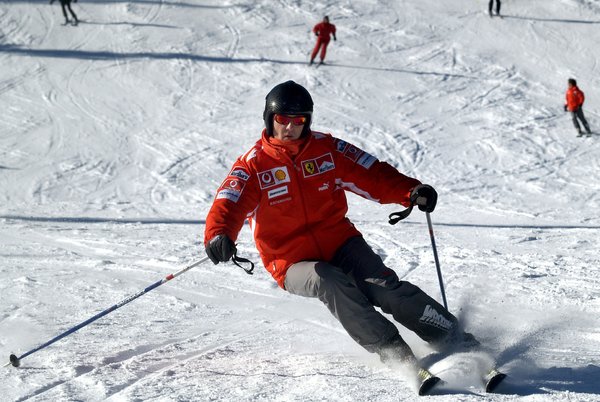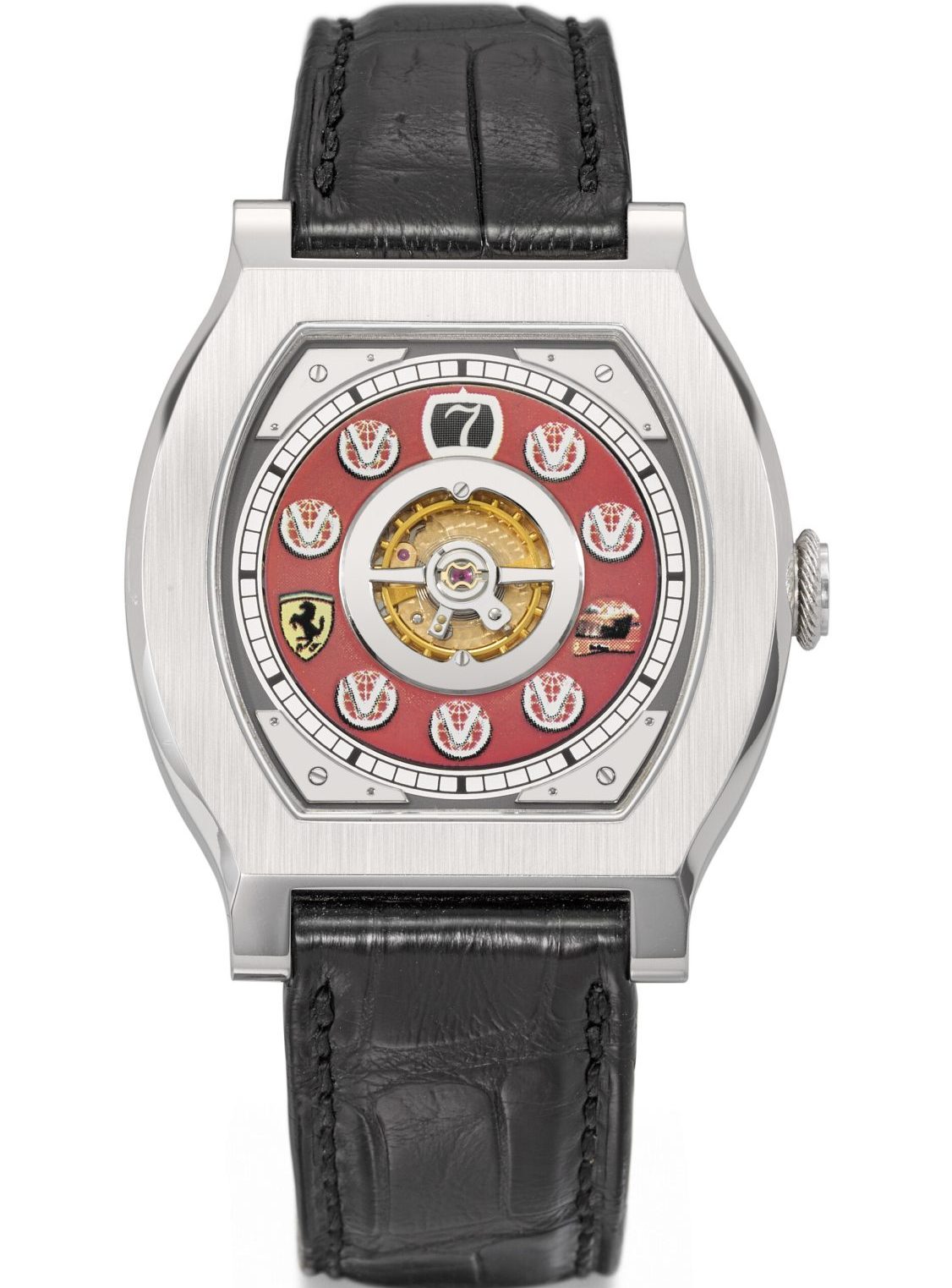
This past ski season marked the 10-year anniversary of Michael Schumacher’s ski accident in France. In December 2013, Michael Schumacher’s life, as well as that of his wife and kids, was changed forever. The race driver suffered extensive brain injuries and has not been seen in public since. His wife is now selling eight of his watches in an auction at Christie’s in Geneva, Switzerland. According to Christie’s, the watches will be for sale together with a collection of other valuable watches on May 13, 2024. The eight watches are part of Schumacher’s private watch collection and are expected fetch between $4-8 million in the auction. The seven-time Formula 1 champion has not been seen since the tragic accident.
There has been much — at times inappropriate — speculation about his condition. The family has shrowded themselves in an unpenetrable cloak of privacy, which unfortunately invites speculation when dealing with a public person. However, they have every right to do so, and this right should be respected. I am not going to speculate on his condition, the fact of the matter is, that we don’t know. All we can safely say is that the person we knew from the outside and his family and friends intimately is gone, and the person left behind deserves protection from public scrutiny.
The facts are: Schumacher suffered a traumatic brain injury on December 29, 2013, and was being kept in an induced coma to help his chances of recovery as the body reacts to a trauma injury with swelling on the brain, which can cause hypoxic damage to the brain. According to Professor Stephan Chabardes, Schumacher had hit the rocks at high speed with the right-hand side of his head. At the time of the accident, he was agitated but not responding to questions and did not have a normal neurological reaction. This is public information from press conferences given by his attending doctors at the time of the accident, and this is where all public information ends.
What we can only assume is that he has suffered or is still suffering from what is called a “disorder of consciousness.” Unless you go through the agonizing experience of having a loved one with disorders of consciousness (DOC), it is impossible to understand what this means. DOC is a state of prolonged altered consciousness, ranging from a coma to a vegetative state to a minimally conscious state. What we see in the movies, where comas are commonly used as a cute plot element, and the patient awakes and might have a bit of memory loss or speaks with a French accent, does not help the public perception of brain injuries and comas. Recovery is slow, painfully slow, in fact. Coma patients from a traumatic brain injury don’t just pop their eyes open and start talking again. Regaining your consciousness means opening your eyes, and that’s all it means. Sometimes, those eyes cannot focus, and the pupils are not centered or even rolled back into the head.
The painful reason I know is because I’ve been there. I stood at my brother’s bedside, talking to him, massaging his limbs, and praying for a miracle while he was in a coma. I was singing Led Zeppelin’s “Stairway to Heaven” when his eyelids opened halfway. We did not even know what it meant then; it seemed like a muscle reflex rather than a conscious movement. Only later were we told that this meant he was no longer considered to be in a coma. Some but not all coma patients are ventilated and slowly need to be taken off the ventilator. Depending on the condition, they may have been intubated or had a trachea. A trachea is when they cut a hole in your windpipe to insert the ventilator instead of being intubated. Intubation leads to many uncomfortable side effects, so coma patients are often ventilated over the hole in their neck. This, unfortunately, means you cannot talk because your voicebox cannot vibrate with a hole. You can put on a so-called speaking valve that enables patients to talk, but it is hard to learn to talk again. The list of things brain injury patients have to relearn is long and progress is slow, depending on the type of brain injury you cannot make a call on the outcome until 6-12 months after the injury.
Brain injuries fall into two categories: hypoxic or anoxic brain injuries (‘ABI’), where the brain is deprived of oxygen and starts dying, and traumatic brain injuries (‘TBI’), where an accident or blunt force trauma has caused swelling and sometimes bleeding on the brain. TBI patients are put into a medically induced coma to reduce the swelling of the brain, as the swelling can cause further damage through secondary hypoxia. In layman’s terms, this means that if you do not treat the swelling, brain cells can irreversibly die from lack of oxygen.
ABI and TBI are very different beasts, as in an ABI, brain cells have irretrievably died. Some may have died with a TBI from the swelling cutting off the oxygen supply to the brain cells, and synapses may have been cut, but the good news with traumatic brain injuries is that these synapses can be rebuilt. But it takes years. Many years. I had an interesting interview with Jamie Crane-Mauzy last year about her recovery from TBI and how incredibly slow and long her recovery was. Jamie told me it took her five years to feel ‘normal’ again. Ever since her TBI, Jamie has become an advocate for better health care for brain injury patients across America to maximize their outcomes.
The tough thing with all brain injuries is that you do not know how far the patient can get in their recovery, and a lot depends on the care these patients receive. Schumacher’s family can afford the best healthcare, and from the few pieces of information leaked, we know that his wife Corinne did her utmost to provide the former Formula 1 driver with the best care in the world. So the public will have to trust that he is receiving the best possible care in the world but that he needs to be protected from the public eye and has every right to be protected from public scrutiny, as people who have not gone through or witnessed first hand the slow recovery of a brain injury patient have no idea.
In the last four years, I have met many carers who were told at the time that there was no hope and to switch off the ventilator in the first few days. While some of these people did subsequently die, I know plenty who did make what is deemed a ‘full recovery.’ But even those with a full recovery are not the person they were before. Some parts of the brain are altered, and some are irretrievably gone. I met a woman who has to tell her husband every day that his parents are dead because he cannot make new memories. Another one who cannot remember the last 10 years of his life and therefore has no emotional connection to his children because they are strangers to him. Brain injury patients often suffer from uncontrollable anger, depression, and lack of inhibition that relatives have to deal with. There are too many stories to share here — but trust me, they are all gut-wrenching.
So before you judge Schumacher or his family and what they should have done or should be doing, know that they are doing their best. Schumacher’s family has been living with a different version of their father, husband, son, brother, and uncle. He is not the Michael they once knew, and they deserve our sympathy for living with this for 10 years under the public eye. His family is now selling a collection of watches from Michael Schumacher’s private collection at an auction at Christie’s. While there is no public statement from the family, we can only assume the funds raised will go towards Michael Schumacher’s care. Watches include a Platinum Vagabondage 1 by F.P. Journe, a small luxury watchmaker in Geneva, which was gifted to Schumacher by former Ferrari CEO Jean Todt and has a personalized engraving dedicated to Schumacher. One can only hope that the auction will exceed expectations and help Corinna in her care for her husband.

One thought on “10 Years After Michael Schumacher’s Ski Accident Family Auctions 8 Watches”